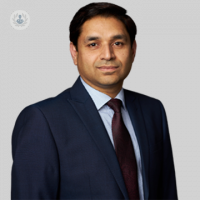Understanding coronary bypass surgery: Restoring heart health through surgical intervention
Escrito por:Coronary Bypass Surgery is a well-established surgical procedure used to treat severe coronary artery disease. In his latest online article, Mr Vivek Srivastava aims to provide a comprehensive understanding of this surgical approach, addressing key questions related to its purpose, techniques, risks, recovery process, and long-term outcomes.

What is coronary bypass surgery, and when is it recommended?
Coronary artery disease can cause symptoms like chest pain (angina) or complications like heart attacks and heart failure and various forms of treatment are possible, depending on severity of coronary disease.
Coronary bypass surgery, also known as coronary artery bypass grafting (CABG), is a surgical procedure that effectively creates new pathways for blood flow so narrowed or blocked areas of coronary arteries are bypassed and there is restoration of good blood supply downstream of such narrowing’s.
CABG is typically recommended when a patient has coronary artery disease which is particularly extensive and severe for e.g., when there is involvement of all three main arteries of the heart or involvement of major artery systems. Less extensive coronary disease may be managed with medications and lifestyle changes or other interventions like stents.
How is coronary bypass surgery performed, and what are the different approaches?
Coronary bypass surgery involves use of other blood vessels, harvested from other parts of the body such as the chest, leg, or forearm, to provide new blood channels (grafts). These grafts are attached onto the coronary arteries beyond the narrowed or blocked areas. There are different approaches to performing CABG surgery, including on-pump (which involves use of a heart-lung bypass machine) and off-pump (performing the procedure on beating heart without using the heart-lung bypass machine). Normally, the two techniques are equivalent. However sometimes one may be better than the other and choice may depend on various factors like the patient's condition, the condition of the heart and the coronary arteries.
What are the potential risks and complications associated with coronary bypass surgery?
As with any surgical procedure, coronary bypass surgery carries some risks. These include stroke, bleeding, infections, wound problems, irregular heart rhythms and graft failure causing heart attacks etc. However, it's important to note that the overall complication rate is low and survival chances are very good. Surgical teams undertake extensive measures to minimise risks with CABG.
How long does the recovery process typically take after coronary bypass surgery?
Coronary bypass surgery is a well-tolerated operation and patients usually spend a few days in the hospital for close monitoring and recovery. Typically, this is 5-7 days but it is important to note that this is variable and depends on a number of factors. Following discharge, patients receive specific instructions for pain management, wound care, medication usage, and physical rehabilitation. While complete recovery may take several weeks or months (2-3 months), most patients can resume their normal activities within a few weeks, building up gradually under the guidance of their healthcare team.
What are the long-term outcomes and lifestyle changes required after coronary bypass surgery?
Coronary bypass surgery has shown excellent long-term outcomes with reduction in symptoms of coronary artery disease and improvement of heart health. However, it is not a permanent solution by itself and it is essential to maintain a heart-healthy lifestyle after surgery. This includes regular moderate exercise, a balanced diet, medication adherence, and follow-up appointments with the healthcare team as required. These lifestyle changes, along with ongoing monitoring, are crucial in ensuring continued success of the procedure.
Mr Vivek Srivastava is an esteemed cardiothoracic surgeon with over 20 years of experience. You can schedule an appointment with Mr Srivastava on his Top Doctors profile.


